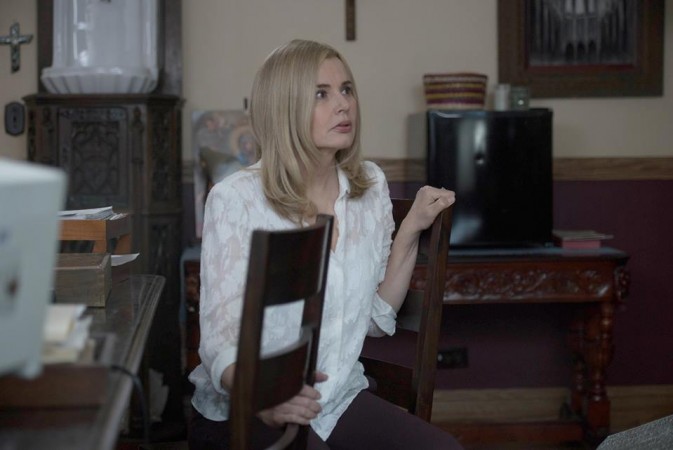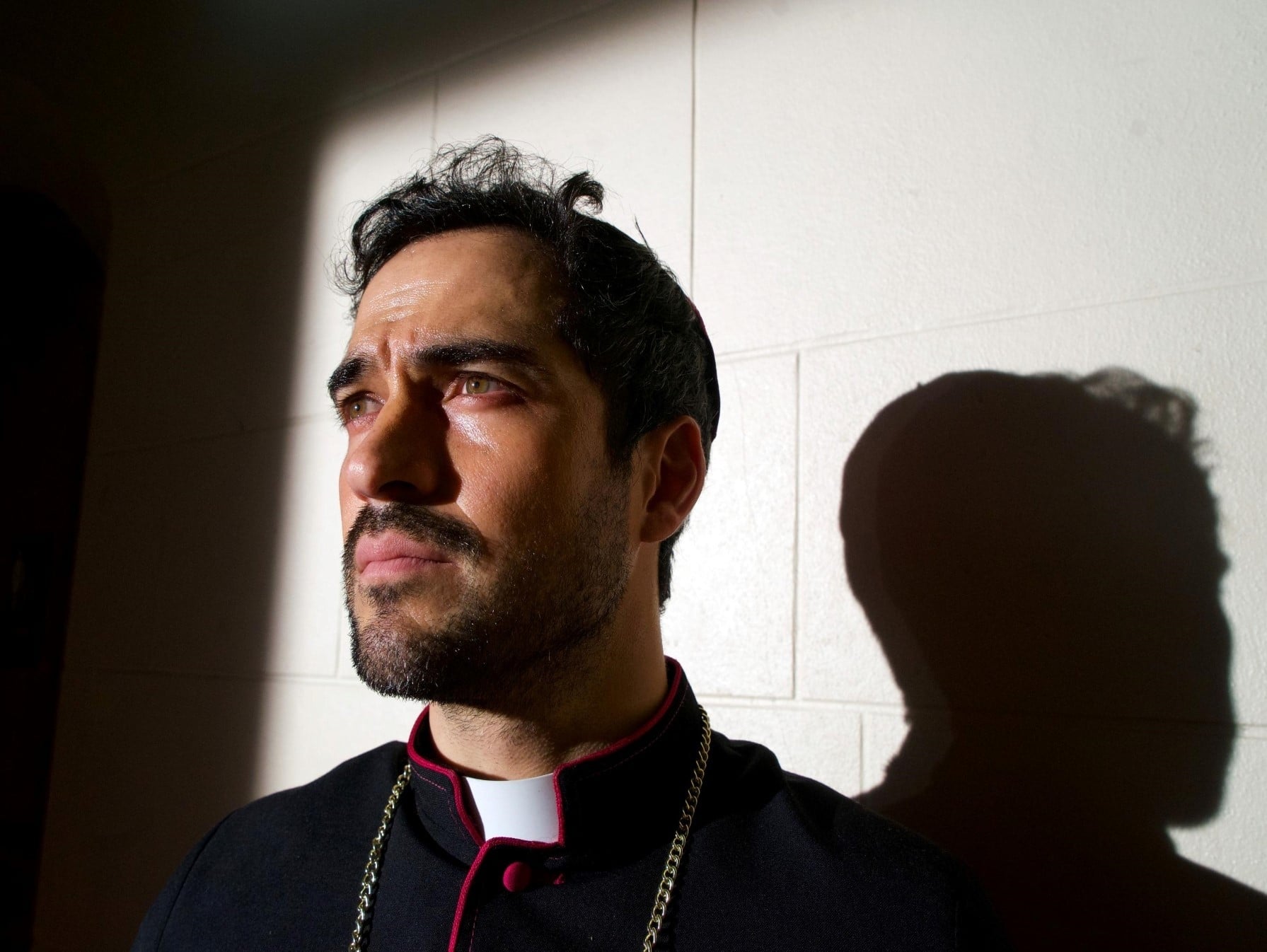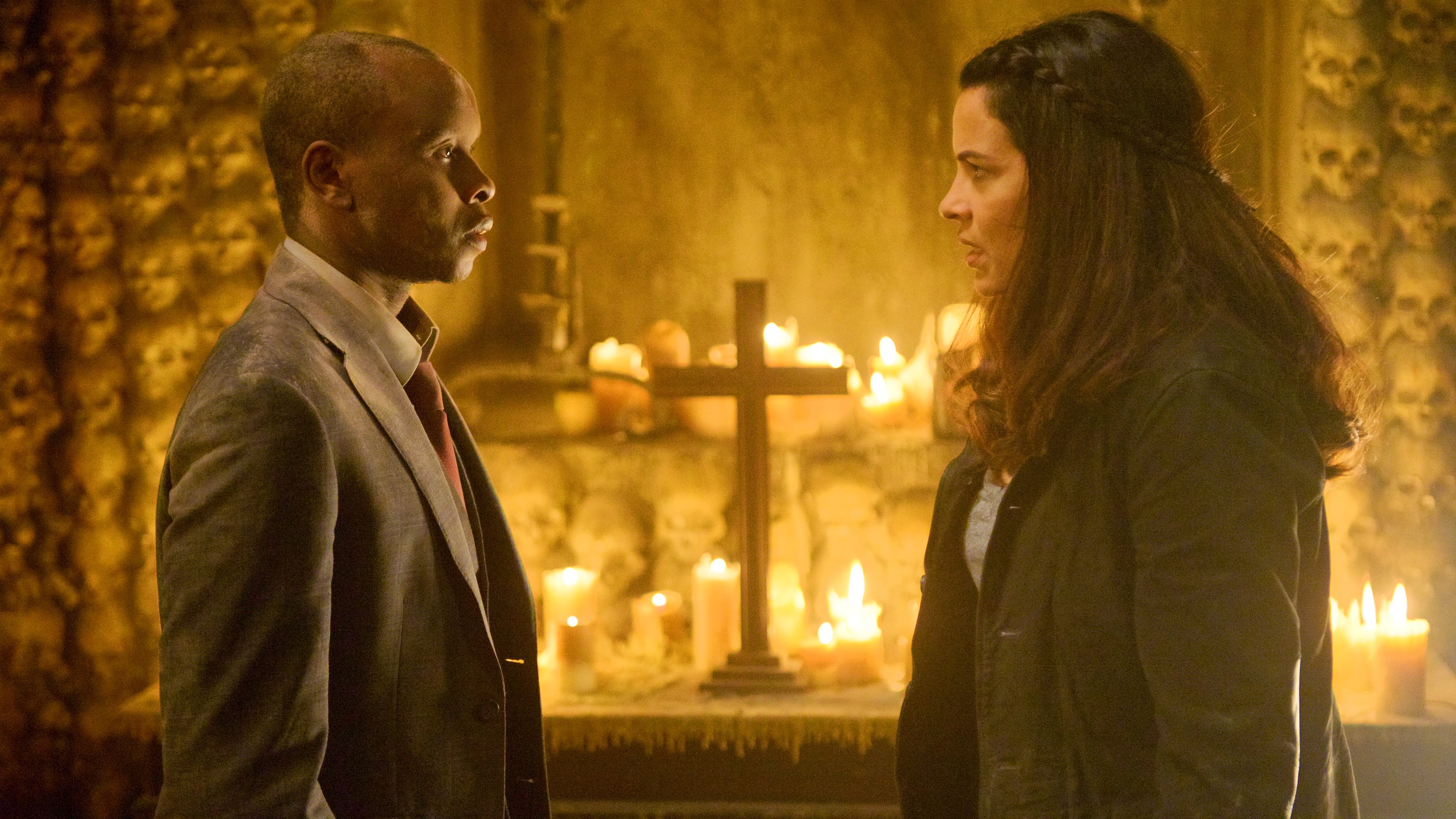Watch The Exorcist
In 1973, theater-goers were introduced to the world of The Exorcist. The movie sparked a cultural phenomenon and its influence sullied the public’s and church’s view of the Ouija board, casting it in a devilish light. Even those that have not watched the movie either in part or whole are familiar with its iconic imagery, as many movies have paid homage to it over the years.
In its time it was viewed as a truly horrific and terrifying film, though by today’s standard it would be considered par for the course. So entrenched in our culture is the narrative that it’s instantly recognizable by even the uninitiated: a girl is possessed, priests show up to perform an exorcism, and lots of terrible things happen. Given the success of the original film and the book it was taken from, it’s little wonder that television networks nowadays would return to its spooky setting.
If you’re considering whether to watch the television series The Exorcist, currently airing on Syfy in the UK, here are some great reasons to do so.
It’s Not a Reboot
In the past several years, we’ve seen lots of networks diving into the history bins to mine what they can from popular shows and movies past. For good or ill, we’ve now got MacGyver and Lethal Weapon, Frequency and The Rocky Horror Picture Show, and at least a few reboots that are continuing to do well, like Hawaii Five-0. Thankfully, writers and producers decided that rebooting The Exorcist wasn’t in anyone’s best interest, especially given the television format.
Instead, this is a continuation of the mythology and world the original movie introduced us to. While none of the main characters from the film pop up (yet?), the original story is cleverly referenced via an internet search about exorcism conducted by Father Tomas. This modern story takes place 40 years after the events that plagued the MacNeil family, only this time it seems the demons might have grander ambitions in mind.
Watch The Exorcist 3
The Exorcist watch online free. Watch The Exorcist online for free on 123Movies. The Exorcist all episodes full online free.

The writers have taken the all-too-familiar trope of child possessed/exorcism needed and use this newer story to add more layers to the narrative. Now we have a different family whose members are struggling with various “demons” of their own, ranging from mental handicaps to grieving the recent death of a friend. Of course, it turns out one of them is really possessed, able to hide behind all the familial chaos going on around it.

Excellent Casting
While the actresses playing the daughters (Hannah Kasulka and Brianne Howey) may not be household names as of yet, the talented duo hold their own against a roster of experienced costars.
Topping out the cast is Geena Davis, an actress well known for decades of film roles, as well as writing and producing. She gives a polished performance of a career woman attempting to balance the roles of manager, wife, caretaker, and mother. Playing her husband is an actor perhaps best known for his comedic performances, Alan Ruck. Here he flawlessly plays the part of an addled father who appears to have succumbed to early-onset Alzheimer’s. He can’t remember much and has difficulty remaining in the moment during conversations. He is charming and polite in his lucid moments, but heartrendingly confused and despondent, a man who understand his plight on some deeper level and knows he can do nothing about it.
But while these two are extraordinary in their roles, the two that really carry the show are Alfonso Herrera (Father Tomas) and Ben Daniels (Father Marcus).
Father Tomas
Portrayed by Alfonso Herrera, Father Tomas is a rising star among the clergy. He is a man very much rooted in the present, believing demons and the like to be fictitious and nothing but a metaphor for the darkness that can be found within us all. It is with some reluctance that he listens to Geena Davis as she reveals her belief that something ominous resides in her house.
Reluctance, at least, until he starts having dreams that connect him directly to Father Marcus. We won’t spoil those particular sequences, but fans of the movie should find some satisfaction in them. Tomas is then left with a conundrum when he finds both Marcus and the contents of the dreams to be real. Are demons present in the world? Were the dreams a message from God?
Most Western audiences might not be familiar with Herrera, who made his mark as a member of the Latin pop group RBD. Since the group’s split in 2008, he’s made a name for himself as a Mexican actor. He’s made almost a dozen movies and appeared on countless television shows, including Sense8. His portrayal of a man questioning his faith and coming to terms with a new reality is gripping and remains on-point through the entire pilot.
Father Marcus
That brings us to Father Marcus, the other pillar supporting the show. In contrast to Father Tomas, Marcus knows very well the reality of demons and exorcisms and, for better or worse, is deemed the preeminent authority on the matter. He presents himself as a man who questions his role in God’s plan, yet is of such begrudging faith that he always dons his hat and sets out on the road when called. He’s a man torn between past failures and duty to try again. Despite his knowledge, you get the feeling he’s just barely hanging on in the fight against evil.
Marcus is played by Ben Daniels, an English actor with quite a large repertoire spanning the stage, Broadway, television, and film. This year he’ll play General Merrick in Rogue One: A Star Wars Story. It’s a treat to see Daniels and Herrera in their brief scene together at the end of the pilot, and it should be interesting to see their dynamic unfold.
Suspense, Not Gore
The movie was of such a graphic nature that Roger Ebert purportedly quipped that it was “stupefying” the film didn’t receive an X rating. Most favorable reviewers alluded to the sheer terror the film invoked, which undoubtedly led to it becoming the highest-grossing R-rated film of all time.
If you’re looking for more of the same, you’ll be disappointed. This is, after all, a series intended for television. Instead, we’re presented with more of a psychological terror, one that builds upon the audience’s knowledge of the film. While you may not be particularly impacted at the outset of the pilot, you’ll definitely be drawn into the terror at its culmination, especially when the demonic presence finally makes itself known.
The Exorcist airs Wednesdays at 9pm on Syfy in the UK.
His next venture was the period film Madrasapattinam depicting a love story from the 1940s, co-starring newcomer Amy Jackson and directed by A.  Despite opening to positive reviews, the film failed to match expectations at the box office, although Arya's performance was praised by critics, claiming that 'powerful, menacing, quiet yet indomitably spirited' in his role while another reviewer claimed he outshone Allu Arjun.
Despite opening to positive reviews, the film failed to match expectations at the box office, although Arya's performance was praised by critics, claiming that 'powerful, menacing, quiet yet indomitably spirited' in his role while another reviewer claimed he outshone Allu Arjun.
“The power’s in the repetition,” says one of two priests who team up to cast out a demon in The Exorcist. The line is a throwaway, and it’s directly related to the plot — he’s talking about the use of incantations in exorcism rites — but in context it sounds like a coded plea to give this new Fox show a chance even though everybody with eyeballs saw the same-named 1973 film, and maybe one of the sequels as well, and is primed to loathe it. As it happens, The Exorcist isn’t the only new Fox show to adapt an existing, wildly popular movie franchise for the small screen: Lethal Weapon, based on the Mel Gibson–Danny Glover buddy cop movies, bows Wednesday evening, right before the season premiere of Empire. (The scheduling makes more practical sense than that of The Exorcist, which is positioned as a follow-up to — yes, really — Hell’s Kitchen.)
Glover’s and Gibson’s roles are played by Damon Wayans and Rectify’sClayne Crawford, but it’s not a good idea to get too high and mighty about that, as the dialogue regularly reminds us: Other characters address the live-wire Los Angeles police detectives as Crockett and Tubbs and Tango and Cash, the better to situate them in a certain, um, tradition. It’s worth pointing out — or perhaps it isn’t, but hey, this is my review — that even though the four Lethal Weapon films were crowd-pleasing hits, critics saw them as an example of television’s corrosive mindlessness invading cinema, and they weren’t wrong. The yammering, suicidal Vietnam vet and widower Riggs and his straitlaced suburbanite partner Murtaugh belonged to a tradition of wisecracking, skull-busting lawmen like Starsky and Hutch, Kojak and Baretta: attack dogs for the Establishment, cool enough to banter with the perps they were trying to bust. Their spectacular adventures wrapped up in the manner of pre-serialized drama, by hitting an implied reset button before the end credits. This was the kind of film series that capped its second installment with Riggs going on a revenge rampage, killing the South African swine who killed both his wife and his new girlfriend, then bleeding out in the hold of a cargo ship while series co-scorer Eric Clapton moaned “Knockin’ on Heaven’s Door,” only to pick up the third film with Riggs in fine fettle and looking for love, with barely a mention of past trauma.
Developed for TV by Matt Miller — the brains behind Fox’s Human Target, which had one excellent season and then became garbage — and directed by Charlie’s Angels rebooter McG, Lethal Weapon is probably best viewed as one of two things: an illustration of the symbiotic relationship between two competing mediums (TV borrowing from films that borrowed from TV), and a reminder that if you’re gonna remake something, you should really just go ahead and remake it.
Miller and McG do a decent job of aping the macho-jocular tone of Richard Donner’s film series, which, at its most ludicrous, felt like Hollywood’s answer to a Jackie Chan action comedy; but the “Look, Ma, no consequences” action seems like a more comfortable fit for movies than for network television at this point, and there are times when you might wish they’d pick a lane and stay in it for a while. The opening sequence of the pilot crosscuts between Riggs, a former Navy SEAL turned El Paso DEA agent, embroiled in a high-speed chase while gabbing on a cell phone to his very pregnant wife, who’s driving herself to the hospital to give birth. As is canon, a car wreck kills her; the story flash-forwards six months to find a grieving, suicidal, alcoholic Riggs adapting to a new job with the LAPD, in partnership with Murtaugh. The latter meets his new mate from afar when Riggs sashays into the middle of a bank robbery with an armload of pizzas and neutralizes the robbers in seconds flat.
Wayans and Crawford bring their own oddball energy to parts that will likely have “Property of Gibson and Glover” stamped on them for all time. Wayans is less world-weary and more manic than his predecessor, while Crawford makes Riggs — an assortment of psycho tics and depressive badass clichés, held together by Gibson’s wild-assed energy — into something close to a plausible human being. At their most competitive, the stars might remind older viewers of Newman and Redford, only in that both actors seem to want to be the charismatic, dangerous one, and that extra-dramatic sense of one-upsmanship is more fun to watch than it has any right to be.
But aside from a few unexpectedly sincere, even lyrical images — such as a close-up of Murtaugh’s heart-surgery-scarred chest, and an overhead shot of a beaten Riggs sprawled outside a bar in Christ-figure pose — there’s nothing in the first two episodes that’ll quash the urge to turn off Lethal Weapon the TV series and put on one of the movies instead. And even for a show that wears its populist tendencies with pride, the show has little faith in its audience’s ability to grasp a simple story: The opening act of episode two flashes back to Riggs’s wife’s death, just in case we’d forgotten about it during the preceding week, and the script is filled with dialogue along the lines of “It sure is great to be married to you, wife and mother of my kids” and “I sure miss being partners with you, former partner.” Not every film series necessarily needs to be a TV show — even one that derives much of its identity from the lamest clichés of pre-millennial television, including a “In my office, now!” captain played by Mad Men’s Kevin Rahm.

Speaking of TV shows of questionable necessity: The Exorcist is a good try at translating a classic from another medium, but it might have had more impact if it knew how to build to its shocks instead of just serving them up as spice, and if we hadn’t seen so many other intimate, creepy TV horror series that use William Friedkin’s film version of William Peter Blatty’s novel as inspiration. The best of the latter is Cinemax’s Outcast, which treats ghosts, demons, and curses both literally, as supernatural forces wreaking havoc with mortal lives, and as metaphors for trauma. The Exorcist might get a handle on that idea eventually, but it never gets there in the pilot, even though it brings it up. (“Demons aren’t real, they are an invention of the church to explain things like demons, mental illness … demons are metaphors.”) Alfonso Herrera stars as Father Tomas, a Chicago priest who’s asked by a well-off parishioner (Geena Davis) to investigate the possible demonic possession of her teenage daughter (Hannah Kasulka). (The symptoms she’s manifesting sound more like evidence of a poltergeist, but whatevs.)
Father Tomas is afflicted by visions of a second priest battling a demon — his future exorcism partner, Father Marcus Keane (Ben Daniels) — and sees him clearly even though (apparently) they’ve never met before. This is one of the only really intriguing notions in the pilot. To keep this show going, series creator Jeremy Slater and his collaborators are going to have to build a rich and multifaceted world with its own internal logic, which is a very different proposition from simply extruding the plot of a well-regarded movie until it fills out a season of television. But even if you can do that, you still run the risk of falling into a “demon of the week” mode and becoming something like The X-Files with projectile vomiting and crucifixes. (The Georgetown possession from the 1973 Exorcist is mentioned in the pilot as backstory, a touch that suggests that this series aims to be more an extension of a movie than a reboot — something along the lines of FX’s Fargo, which incorporates plot points from the 1996 Coen brothers film.) The David Fincher–style neon-dumpster color scheme, multilayered sound design, and crackerjack supporting performances (including Alan Ruck as Davis’s deeply damaged husband) make it worth a look, though whether the power of Christ will compel repeated viewings remains to be seen.